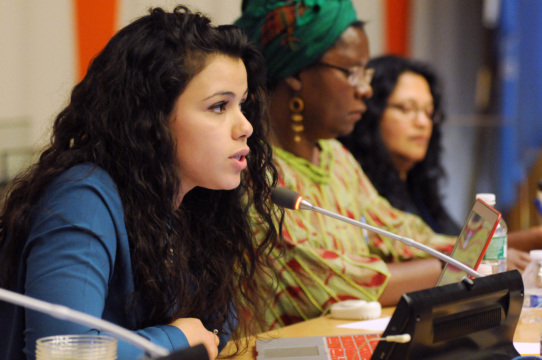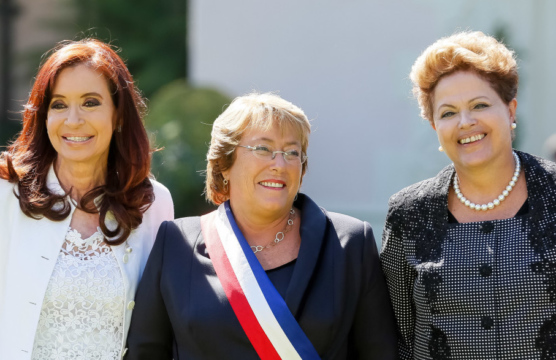What Roles are Women Playing in Mexico’s Drug War?
What roles are women playing in Mexico’s brutal drug trafficking war?
How do Latin America’s total abortion bans affect women’s health and human rights and society at large? Who should make decisions about whether to end a pregnancy? Should society understand abortion from a religious or public health perspective? These are just some of the difficult questions that panelists raised during the June 10th Symposium on Reproductive Rights in Latin America, jointly sponsored by the Inter-American Dialogue and the Center for Reproductive Rights.
Each of the symposium’s three panels addressed reproductive rights in Latin America through a particular lens. To start the symposium, Chilean Congressman Vlado Mirosevic Verdugo and Morena Herrera, president of the Citizen’s Group for the Decriminalization of Therapeutic, Ethical and Eugenic Abortion, Feminist Collective in El Salvador, discussed the health and human rights consequences of total abortion bans in their respective countries.
Mexican political scientist Denise Dresser and Uruguayan vice minister of health Dr. Leonel Briozzo assessed the effects of abortion liberalization on democracy and social equity in their countries. Harvard professor Jocelyn Viterna, meanwhile, addressed not only how abortion bans negatively impact reproductive health, but also how they create criminals of innocent women.
Catholics for the Right to Decide’s Julián Cruzalta of Mexico, Chilean family law and international human rights attorney Macarena Saez of American University’s Washington College of Law, and Georgetown Law Center’s Oscar Cabrera closed the symposium by analyzing how liberalizing or tightening abortion bans can affect women’s civil rights, democracy, social equity, and health.
Six countries in the world completely ban abortion, and five of them are in Latin America. During his presentation, Briozzo noted that the region is home to some of the world’s most Catholic countries, several of which also have alarmingly high maternal mortality rates. The Church, a powerful institution in many Latin American societies, has significantly influenced how the region understands abortion, Cruzalta asserted. He further argued that the region must reassess its abortion regulations for “profound ethical reasons.” Society and the state should neither “judge a woman’s conscience” nor violate her human rights. Panelists also mentioned that political and social institutions, including the Church and political parties, play a powerful role in advocating for their ideological position on reproductive rights legislation and influencing public opinion and lawmakers to follow suit.
During his presentation, Mirosevic Verdugo critiqued his country’s Pinochet-era constitution for including a “right to life” amendment meant to preempt future challenges to an abortion ban, even though therapeutic abortion was previously legal in Chile for over 40 years. Governments since the country’s democratic transition have been unable to change the constitution or decriminalize abortion. Mirosevic Verdugo believes that both legislative measures will succeed during President Bachelet’s current term.
In El Salvador, Herrera noted, a multiparty group in the national legislature favors legalization but lacks sufficient votes to overturn the country’s ban on abortion, which is enshrined by a constitutional amendment holding that life begins at conception. Viterna, meanwhile, asserted that El Salvador over-penalizes violations of its abortion laws compared to its neighbors, and emphasized the importance of relating compelling personal stories to foster popular interest and support for efforts to reform laws regulating abortion.
To make informed decisions, women must have adequate information, argued Briozzo and Cabrera. Cabrera asserted that less informed women are more likely to undergo unsafe abortions, while both panelists stated that the public must understand abortion differently. When society affirms a women’s right to health, abortion becomes a right the law must protect, Cabrera argued. Briozzo, meanwhile, stressed the need to change the terms of the debate, asserting, “we can’t keep making the same arguments from the 1970s,” with respect to abortion.
Dresser framed the legalization and decriminalization of abortion in Mexico City and the resulting backlash in terms of democratic governance and citizenship. “Democracy is not just about the alternation of power among political parties, but about how we treat our women and girls,” she argued. Similarly, Saez stated that as long as society values women as mothers needing protection and not as individuals with rights, real citizenship for women will remain elusive.
While it remains a challenge to change total abortion bans, manage backlash from decriminalization, and transform strongly held views about this polarizing issue, the symposium’s panelists agreed that the status quo of reproductive laws in most of Latin America has unacceptable consequences for the well-being and rights of women and for that reason requires thoughtful reevaluation.
What roles are women playing in Mexico’s brutal drug trafficking war?
How are women faring in Latin America? Where has progress been made and how has that been achieved?
Would this be a more compassionate, more peaceful planet if more of it were ruled by women?


